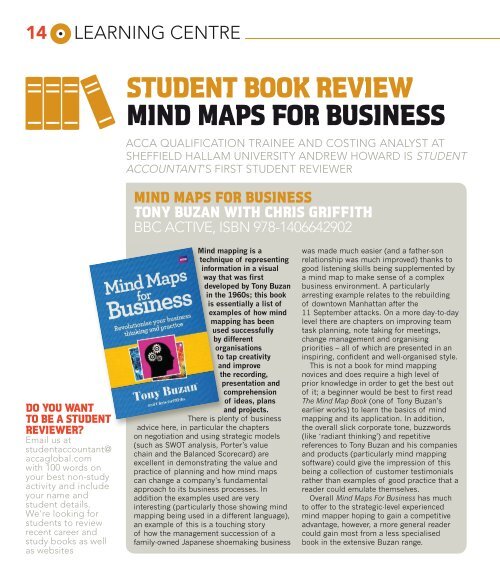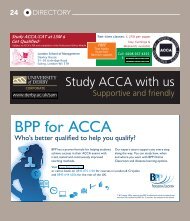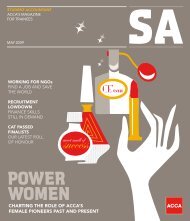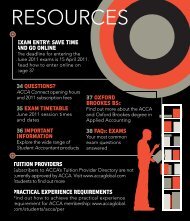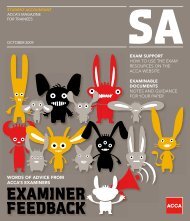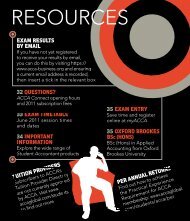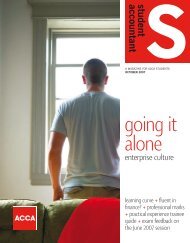STUDENT BOOK REVIEW MIND MAPS FOR BUSINESS
STUDENT BOOK REVIEW MIND MAPS FOR BUSINESS
STUDENT BOOK REVIEW MIND MAPS FOR BUSINESS
- No tags were found...
You also want an ePaper? Increase the reach of your titles
YUMPU automatically turns print PDFs into web optimized ePapers that Google loves.
14 LEARNING CENTRE<strong>STUDENT</strong> <strong>BOOK</strong> <strong>REVIEW</strong><strong>MIND</strong> <strong>MAPS</strong> <strong>FOR</strong> <strong>BUSINESS</strong>ACCA QUALIFICATION TRAINEE AND COSTING ANALYST ATSHEFFIELD HALLAM UNIVERSITY ANDREW HOWARD IS <strong>STUDENT</strong>ACCOUNTANT’S FIRST <strong>STUDENT</strong> <strong>REVIEW</strong>ER<strong>MIND</strong> <strong>MAPS</strong> <strong>FOR</strong> <strong>BUSINESS</strong>TONY BUZAN WITH CHRIS GRIFFITHBBC ACTIVE, ISBN 978-1406642902DO YOU WANTTO BE A <strong>STUDENT</strong><strong>REVIEW</strong>ER?Email us atstudentaccountant@accaglobal.comwith 100 words onyour best non-studyactivity and includeyour name andstudent details.We’re looking forstudents to reviewrecent career andstudy books as wellas websitesMind mapping is atechnique of representinginformation in a visualway that was firstdeveloped by Tony Buzanin the 1960s; this bookis essentially a list ofexamples of how mindmapping has beenused successfullyby differentorganisationsto tap creativityand improvethe recording,presentation andcomprehensionof ideas, plansand projects.There is plenty of businessadvice here, in particular the chapterson negotiation and using strategic models(such as SWOT analysis, Porter’s valuechain and the Balanced Scorecard) areexcellent in demonstrating the value andpractice of planning and how mind mapscan change a company’s fundamentalapproach to its business processes. Inaddition the examples used are veryinteresting (particularly those showing mindmapping being used in a different language),an example of this is a touching storyof how the management succession of afamily-owned Japanese shoemaking businesswas made much easier (and a father-sonrelationship was much improved) thanks togood listening skills being supplemented bya mind map to make sense of a complexbusiness environment. A particularlyarresting example relates to the rebuildingof downtown Manhattan after the11 September attacks. On a more day-to-daylevel there are chapters on improving teamtask planning, note taking for meetings,change management and organisingpriorities – all of which are presented in aninspiring, confident and well-organised style.This is not a book for mind mappingnovices and does require a high level ofprior knowledge in order to get the best outof it; a beginner would be best to first readThe Mind Map Book (one of Tony Buzan’searlier works) to learn the basics of mindmapping and its application. In addition,the overall slick corporate tone, buzzwords(like ‘radiant thinking’) and repetitivereferences to Tony Buzan and his companiesand products (particularly mind mappingsoftware) could give the impression of thisbeing a collection of customer testimonialsrather than examples of good practice that areader could emulate themselves.Overall Mind Maps For Business has muchto offer to the strategic-level experiencedmind mapper hoping to gain a competitiveadvantage, however, a more general readercould gain most from a less specialisedbook in the extensive Buzan range.
<strong>STUDENT</strong> ACCOUNTANT ISSUE 08/201015<strong>STUDENT</strong> <strong>REVIEW</strong>ER FACTFILEANDREW HOWARDWHAT POSTS DID OUR FIRST <strong>STUDENT</strong> <strong>REVIEW</strong>ER HOLD, WHY DID HE CHOOSEACCOUNTING AS A CAREER, AND WHAT DOES HE ENJOY MOST ABOUT BEING ANACCOUNTANT? ANDREW HOWARD TELLS US ALL ABOUT HIS CAREER TO DATESTAGE OF STUDIESACCA Professional level, I’ll be takingmy last exam (Paper P3, BusinessAnalysis) in June 2010.JOB ROLEI am the costing analyst at SheffieldHallam University (SHU) so amheavily involved in the preparationand testing of cost allocation models(for example on course costing andpricing), collecting data on academicstaff activity and reporting to the UKgovernment higher education fundingbodies on the costs of teachingstudents in different subjects andreporting the surplus or deficit theuniversity generates on teachingand research. I have been in this rolefor eight months having previouslybeen the management accountant for aresearch centre in one of the universityfaculties; before joining SHU I worked inindustry as a management accountantand financial accountant.My current role is extremely variedand brings me into contact with somevery intelligent and interesting peopleon the academic staff.On the downside when I’m inthe university library preparing forexams and I look around at all theundergraduates it makes me feelrather old.BEST THING ABOUT BEINGAN ACCOUNTANTBefore retraining to be an accountantI led a research and developmentteam in a company that madeheatproof insulation materials formetals production.As part of the testing trials for a newproduct I had to observe the outsideof the base of a blast furnace (whichwas in an open shed in Redcar by theNorth Sea) for 24 hours while wearinga special suit to protect me from moltenmetal splashes. Unfortunately, the suitwas three sizes too small, the frontof my body was very hot from beingnear a blast furnace and my back wasvery cold from the wind coming offthe sea.I realised that being office basedwould suit me better and I had begunto find that I preferred the dataanalysis and commercial costingelements of my job so I decided tostart the ACCA Qualification in eveningclasses and then eventually found anaccountant role.So for me, the best thing aboutbeing an accountant is the opportunityto use my skills, work at the centre ofan organisation and feel I am making aworthwhile contribution.BE<strong>FOR</strong>E JOINING SHEFFIELD HALLAM UNIVERSITY,I WORKED IN INDUSTRY AS A MANAGEMENTACCOUNTANT AND FINANCIAL ACCOUNTANT.THE BEST <strong>FOR</strong> ME ABOUT BEING AN ACCOUNTANT ISTHE OPPORTUNITY TO USE MY SKILLS AND FEEL I AMMAKING A WORTHWHILE CONTRIBUTION.
16 learning centreseven top tipsself-studytrying out some simpletechniques will help improveyour exam preparationhow to passDownload the free report atwww.pass1sttime.com/accareportclick the ‘play’ button on thescreen to watch the videocan’t see the video?read the script on page 21 Make use of supportMake use of any distance learning support you have. Some of you will be distance-learning candidatesso will have access to remote support from tutors – use it.2 Use the latest materialsSometimes students studying at home will use second-hand study materials, which may be out of date.The syllabus for some exams changes so you must make sure you have the latest materials – or at leastknow and have access to whatever material has changed.3 Find a peer groupOne of the most effective ways to learn is to have a peer group of people who are all trying to achievethe same goals. Find friends or people you may know and regularly meet up or communicate tosupport each other through your exams.4 Be disciplinedBe disciplined in your studies. It’s very easy to want to take extra breaks, or not really push yourselfhard when studying at home. You must focus on the reasons why you are taking the exams and usethose and strict time management to keep yourself disciplined.
5 Immerse yourself in a topicWhen you study at a college you will concentrate on one topic or paper for days at a time. The reasonis that the human brain learns best when immersed in learning. Use this principle and focus on onetopic or one paper for hours at a time. It may get boring, but it works.6 Do practice questionsIt can be very easy to become lazy about doing practice questions at home. You can fool yourself intothinking that just because you have read something you know it and don’t have to test yourself. Youmust do practice questions as you study.7 Recreate exam conditionsIn order to perform well in the actual exam you must get your body and mind trained to be able tocope with the physical and mental pressure. So make sure you do mock exams under exam conditionsincluding sticking to time limits, using a small desk, sitting continuously for just over three hours,writing neatly, etc. The better you can recreate exam conditions the better you will do in the real exam.Visit www.pass1sttime.com/accareport to download a special free report on passing your ACCA examsfirst time.VIDEO SCRIPT – GETTING MOTIVATED‘I’ve successfully completed finance qualifications through self study, so I hopesome of my advice can help you to do the same.The main challenge most students have is around motivation to put the hours ofstudying in. When there’s no tutor to watch over you like there is in class it can bevery easy not to study and not push yourself.Key techniques you can use here to get yourself to study, sometimes at the end ofa full day of work, include:¤ Focusing on the reasons why you are taking the exams – think of the biggerpicture for you, your family, loved ones, now and in the future.¤ Considering the pain of failing and the impact this could have on youemotionally and financially. This should help you start studying. But once youhave started, focus on the benefits of passing, this should keep you going.¤ Overcoming challenges. The chances are that various problems will come upthat will make it difficult for you to study at home. It may not be quiet whereyou are, or you may have unsupportive people around you, or may have otherresponsibilities. The key thing to remember is that anyone that ever achievedanything worthwhile had to go through their own challenges. The key is not togive up and push through them.For more on studying and exam technique come to the pass1sttime.com websiteand download the free report.
C ERARDUA ADASTAREstudent accountant issue 08/201017STUDY <strong>FOR</strong>ACCA @ZenithUniversityCollegeZenithNTR E<strong>FOR</strong>PUniversity CollegeRO FEPESSIONAL & ACEADMXCEICCE NLELQUALIFIED & RELIABLE LECTURERSFREE ACCESS TO INTERNETFREE STUDY MANUALSWELL STOCKED LIBRARYEXCELLENT LEARNING & TEACHING ENVIRONMENTContact: ACCA Advisors or RegistrarMr. Commey (027.4306 810), Mr. Pius (024.4374 788)E-MAIL: commey@zenithcollegeghana.orgYou may also obtain information on ACCA frominfo@gh.accaglobal.com ORwww.accaglobal.com/contact/connectwww.zenithcollegeghana.org
18 LEARNING CENTREOBU RAP<strong>REVIEW</strong> <strong>FOR</strong> PERIOD 18THE PROJECT AIMS TO ENHANCE AND EXTEND THE KNOWLEDGE AND SKILLS GAINEDBY ACCA <strong>STUDENT</strong>S IN THEIR PROFESSIONAL STUDIES AND SO TO IMPROVE <strong>STUDENT</strong>S’EFFECTIVENESS AS PROFESSIONAL ACCOUNTANCY <strong>STUDENT</strong>S AND/OR PRACTITIONERSThe project is graded A, B, C or failwith this mark counting towards theclass of degree awarded for post-2007ACCA students.For period 18, 1,462 projects weresubmitted, and of these 762 projectspassed, a pass rate of 52%, which wasthe same as for period 17. Six RAPswere deferred for further investigationrelating to academic conduct issues.Once projects have been marked, allfails, marginal projects and a sample ofother projects are moderated.The research project: why students failThe new RAP guidelines and markingcriteria continue to affect the pass ratewith students still submitting projectsunder the old guidelines.Weak referencing continues to bea cause for failure. Students needto ensure they reference their workusing the Harvard referencing systemthereby acknowledging the source oftheir information. Visit www.brookes.ac.uk/services/library/resources/harvard.doc for details of howto reference correctly.To fail to do so is deemedto be plagiarism, a seriousacademic offence. Fromperiod 19 all studentsare required to keepan electronic copy oftheir submitted RAPand a sampleof these willbe passedthrough theweb-basedtool Turnitinwhich allowsFURTHERIN<strong>FOR</strong>MATIONAll students who fail are providedwith marker and moderator comments.Students should pay particular attentionto these comments and seek to addressthem. All students who fail from period 19onwards will be provided with are-submission guide to provide additionalsupport. Visit www.accaglobal.com/students/bsc/ for more informationabout the Oxford Brookes UniversityBSc (Hons) in AppliedAccounting degree.academic staff to check for improperuse of sources or potential plagiarism.Go to www.brookes.ac.uk/library/skill/plagiarism.html for more information.The business and financialperformance of an organisation overa three-year period (Topic 8) continuesto be the most popular RAP topic. Asignificant number of students failbecause they do not recognise the needfor the business context and the implicitrequirement from this that they need toinclude a comparator. The comparatorcan be that of a competitor business orindustry averages.The external examiner suggestedthe following:‘Students should put the analysisin the context of the industry orindustries concerned, the relative riskof the industry, trends in the industrywhere appropriate and the impacts ofchanges in the economic, political andregulatory environment.Due cognisance should beaccorded to environmental factors andsustainability in arriving at conclusionsand recommendations.’Students who went outside of the20 published project topics oftenproduced poor results. Therefore, it isrecommended that students seek toremain within the published topics.The Skills and Learning Statement: whystudents failThe purpose of the Skills and LearningStatement is for students to showthat they have developed the key‘graduate’ skills of self-reflectionand communication. Studentswho failed often did not link theirpresentation clearly to their RAPfindings. Additionally, students willhave developed research questions toshow what they are trying to researchand analyse from their RAP.They need to reflect on whetherthey have answered these questions.Students fail in this area generallybecause they write about the answersthey gave to their mentor ratherthan their own research questionsand they have not reflected on theirresearch questions.Students are required to include acopy of their presentation and wherethis was not included students failedtheir RAP.Please note, students who submit theold Key Skills Statement will fail.Jane Towers-Clark, OBU BSc(Hons) in Applied Accountingprogramme director
<strong>STUDENT</strong> ACCOUNTANT ISSUE 08/201019TALKING TECHNOLOGYMICROBLOGGINGANYONE CAN MICROBLOG, AND MANY PEOPLE DO. UNDERSTANDINGTHE PROS AND CONS BE<strong>FOR</strong>E YOU START WILL HELP YOU AVOID ANYPOTENTIAL EMBARRASSMENTAmeba.jp. Emote.in. Identi-ca.Jaiku. Plurk. Qaiku. SMSGupShup.Twitter. If none of these names meananything to you, where have you beenfor the past few years? As socialnetworking sites such as Chinaren,Facebook and Odnoklassnikihave become mainstream, thepersonal blog has been joined bythe microblog, spawning a host ofmicroblogging websites.In the same way as blogs enableauthors to post ‘diary-like’ entriesthat potentially millions of peoplecan regularly read and respond to,their offspring – the microblog – alsoprovides its authors with the opportunityto share, and become (to quote Twitter),‘part of a global community of friendsand strangers answering one simplequestion: What are you doing?’ – evenif you may sometimes wonder whythey asked.Thanks to service providers fromAmeba.jp to Twitter, anyone with internetaccess can leap into the blogosphere.Once you have opened an account(usually free) you can post short textmessages (typically between 140 and200 characters maximum) and/ormultimedia messages (such as images,audio and video), to the website,from where you can share them with‘private’ subscribers or make thempublicly available.Those broadcasting, receiving andforwarding messages can now accessmicroblogs using numerous devicesand interfaces, ranging from InstantMessages sent from or delivered to yourdesktop, to SMS text messages sentor delivered via mobile phone or PDA.WWW.But this widespread accessibility hasadvantages and disadvantages, and youneed to be aware of them, inside andoutside the workplace.On the plus side, microblogs areall about sharing. So, they can enableindividuals to exert great influencecollectively, level the playing fieldbetween small and large organisations,and, when exploited in a corporateenvironment (with tools such asPresent.ly and Yammer), theycan augment or replace email forcommunications within project teams,interdepartmental ‘communities’,supply chains, and more.On the downside, microblogs are allabout sharing, and not everything thatcan be shared should be. Most ‘personal’messages are harmless and of passinginterest, but there is a danger that thesuperficial informality and immediacyof microblogging can create a falsesense of security. A message may beposted with no more than a fleetingthought, but once it is in the publicdomain it can develop a life of its own.As with other Web 2.0 and socialnetworking developments (seeStudent Accountant, October 2009),microblogging turns everybody into apotential influencer, and the resultscan be both fortunate and unfortunatefor those affected – as individuals,businesses and even governmentshave found to their cost. Incautiousmessages have resulted in peoplelosing their jobs, being sued, and led tocorporate embarrassment.This will not, and should not, preventcolleges, tutors, recruiters, ACCA, itsmembers, students and their family,friends, and colleagues from using Jaikuor Plurk, or Twitter (and various othermicroblogs) to enhance communication(or indulge in a little self-promotion).But it should make you pause forthought before you share your messagewith the world.MICROBLOGS ARE ALL ABOUT SHARING. SO, THEY CANENABLE INDIVIDUALS TO EXERT GREAT INFLUENCECOLLECTIVELY AND LEVEL THE PLAYING FIELD BETWEENSMALL AND LARGE ORGANISATIONS.
20 LEARNING CENTREHOW TOGET HEADHUNTEDEMPLOYERS OFTEN ASK RECRUITERS TO IDENTIFY AND APPROACH SUITABLEPOTENTIAL RECRUITS. AND INTERNET-SAVVY FINANCE MANAGERS AREINCREASINGLY USING WEB NETWORKING TO GO HEADHUNTING THEMSELVES. SOHOW DO YOU POSITION YOURSELF TO GET THAT CALL?Why not acquire a reputation for beingan expert in your field? Like manyaspiring finance professionals, youmay have registered on professionalnetworking websites, linked up withcolleagues and fellow students andthen… what?The fact is, unless you’re active indiscussion forums, your profile – and,therefore, you – will remain largelyinvisible to recruiters and potentialemployers. But by asking intelligentquestions or joining in debates aboutwhat’s going on in your local marketor the accountancy profession, you’llattract more attention, but for all theright reasons. Make sure to join groupsTHE FACT IS, UNLESS YOU’RE ACTIVE IN DISCUSSION<strong>FOR</strong>UMS, YOUR PROFILE – AND, THERE<strong>FOR</strong>E, YOU –WILL REMAIN LARGELY INVISIBLE TO RECRUITERS ANDPOTENTIAL EMPLOYERS.that are relevant to the industriesor locations in which you want towork, even if you don’t already workthere. Remember – you don’t haveto proactively market yourself as ajobseeker; if you’re getting your voiceheard, you’ll be noticed soon enough.Also consider attending events run byrecruitment consultants. In an age whennetworking skills are a near-essentialtool for career advancement, turningup at a topical talk needn’t signal thatyou’re on the market (provided you’renot brandishing a pile of bang upto date CVs). Make the effortto talk to fellow students andpassed finalists, not just therecruiters – if one of themhears of a vacancy that’smore likely to suit you thanthem, you want themto recommend you tothe person in chargeof invites to interview.They won’t do thatif you’ve shunned themin favour of potentiallymore immediatelyuseful attendees.BE BOLD – BUT NOTTOO BOLDMaster the art of the subtlehint. It’s handy to let the right peopleknow that you would welcome a directapproach for the right role. However,be careful not to make overly negativeremarks about your current role (andcertainly not about your colleagues),and confine any such comments toconversations, not emails. Once yourcharacter assassination of your bossis out there on the web, there’s noknowing when it might come back tohaunt you. Far better to talk aboutit perhaps being time for a freshchallenge or new horizons – peoplewill know exactly where you’recoming from.This applies equally to internalnetworking if you work in a largeorganisation with lots of differentfinance teams.If you’re in practice, while it’sinadvisable to put it about that you’reopen to offers, re-double your effortsto enhance your reputation with clientcontacts, who may themselves be linksto opportunities you’d like to explore(they’ll often be asked by recruiters fornames of good people seeking roles inindustry or commerce).Finally, be prepared for the momentwhen your efforts pay off. They’ll bewasted if you crumble with nerves whenthe headhunter finally calls…
Revise with ouraward winning onlineInterActive platform.BUYACCA REVISION PAPERGET FREE *Multiple awards. Thousands of ACCA students.Find out how we can help you pass first time this June: LSBF.org.uk1. Number 1 for OnlineAccountancy Website of theYear as voted by PQ Magazineand Pass Magazine.2. Financial Times * ListingLSBF is listed at number 19 inthe 2010 Global Financial TimesOnline MBA programmes listing.3. PQ MagazineLSBF is the only college to winPQ Magazine’s College of theYear, two years in a row. LSBFCIMA tutor Jenny Hughes is PQMagazine’s 2010 Tutor of the Year.AWARD WINNER— 2009 —Test drive your tutors before you book your revision to win a Mini Cooper * !Visit LSBF.org.uk/SA for more details and to register.LONDONBIRMINGHAMMANCHESTERINTERACTIVELSBF.org.uk+ 44 (0) 207 823 2303FBT-Global.com+ 44 (0) 121 616 3370LSBF.org.uk/Manchester+ 44 (0) 161 713 1777StudyInterActive.org+ 44 (0) 207 099 0077*”FT” and “Financial Times” are trademarks of The Financial Times Ltd. See website for details. Terms and conditions apply. E&OE.


